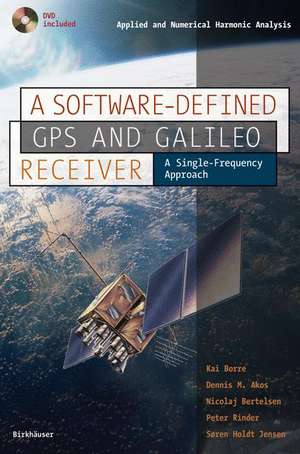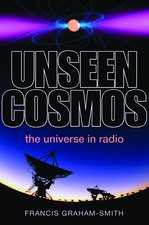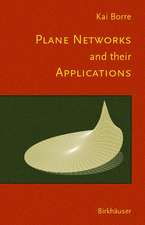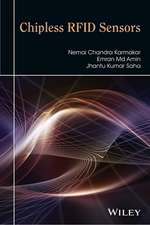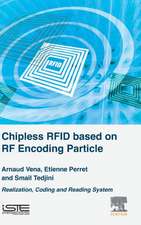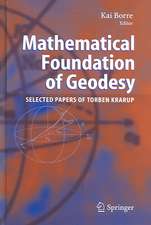A Software-Defined GPS and Galileo Receiver: A Single-Frequency Approach: Applied and Numerical Harmonic Analysis
Autor Kai Borre, Dennis M. Akos, Nicolaj Bertelsen, Peter Rinder, Søren Holdt Jensenen Limba Engleză Mixed media product – 9 noi 2006
One of the unique features of the work is the interactive approach used, giving readers the ability to construct their own Global Navigation Satellite Systems (GNSS) receivers. To construct such a reconfigurable receiver with a wide range of applications, the authors discuss receiver architecture based on software-defined radio (SDR) techniques. The presentation unfolds in a systematic, user-friendly style and goes from the basics to cutting-edge research. A complete GPS software receiver implemented using MATLAB code as well as GPS and GIOVE-A signal records allows readers to change various parameters and immediately see their effects. A hands-on method of testing the material covered in the book: supplementary front-end hardware equipment—which may be purchased at http://ccar.colorado.edu/gnss—enables readers working on a Windows or LINUX system to generate real-world data by converting analog signals to digital signals.
The book is aimed at applied mathematicians, electrical engineers, geodesists, and graduate students. It may be used as a textbook in various GPS technology and signal processing courses, or as a self-study reference for anyone working with satellite navigation receivers.
Din seria Applied and Numerical Harmonic Analysis
-
 Preț: 399.29 lei
Preț: 399.29 lei - 20%
 Preț: 673.02 lei
Preț: 673.02 lei - 17%
 Preț: 431.76 lei
Preț: 431.76 lei - 19%
 Preț: 443.08 lei
Preț: 443.08 lei -
 Preț: 412.57 lei
Preț: 412.57 lei - 15%
 Preț: 550.04 lei
Preț: 550.04 lei - 15%
 Preț: 653.98 lei
Preț: 653.98 lei - 18%
 Preț: 1014.28 lei
Preț: 1014.28 lei - 15%
 Preț: 647.92 lei
Preț: 647.92 lei -
 Preț: 413.37 lei
Preț: 413.37 lei - 15%
 Preț: 648.74 lei
Preț: 648.74 lei - 15%
 Preț: 654.77 lei
Preț: 654.77 lei - 15%
 Preț: 636.80 lei
Preț: 636.80 lei - 15%
 Preț: 532.89 lei
Preț: 532.89 lei - 15%
 Preț: 646.62 lei
Preț: 646.62 lei - 15%
 Preț: 653.98 lei
Preț: 653.98 lei -
 Preț: 397.38 lei
Preț: 397.38 lei - 15%
 Preț: 656.43 lei
Preț: 656.43 lei - 15%
 Preț: 661.97 lei
Preț: 661.97 lei - 18%
 Preț: 957.13 lei
Preț: 957.13 lei - 24%
 Preț: 829.74 lei
Preț: 829.74 lei -
 Preț: 398.35 lei
Preț: 398.35 lei - 20%
 Preț: 569.86 lei
Preț: 569.86 lei -
 Preț: 392.21 lei
Preț: 392.21 lei - 18%
 Preț: 1121.76 lei
Preț: 1121.76 lei - 18%
 Preț: 1001.32 lei
Preț: 1001.32 lei -
 Preț: 387.75 lei
Preț: 387.75 lei - 15%
 Preț: 653.98 lei
Preț: 653.98 lei - 20%
 Preț: 567.32 lei
Preț: 567.32 lei - 20%
 Preț: 573.77 lei
Preț: 573.77 lei -
 Preț: 406.80 lei
Preț: 406.80 lei -
 Preț: 387.38 lei
Preț: 387.38 lei - 5%
 Preț: 1168.71 lei
Preț: 1168.71 lei -
 Preț: 400.85 lei
Preț: 400.85 lei -
 Preț: 398.15 lei
Preț: 398.15 lei - 15%
 Preț: 644.49 lei
Preț: 644.49 lei - 19%
 Preț: 575.84 lei
Preț: 575.84 lei - 15%
 Preț: 703.71 lei
Preț: 703.71 lei - 20%
 Preț: 334.71 lei
Preț: 334.71 lei -
 Preț: 405.06 lei
Preț: 405.06 lei - 15%
 Preț: 536.96 lei
Preț: 536.96 lei
Preț: 525.54 lei
Preț vechi: 618.27 lei
-15% Nou
Puncte Express: 788
Preț estimativ în valută:
100.57€ • 109.21$ • 84.48£
100.57€ • 109.21$ • 84.48£
Carte tipărită la comandă
Livrare economică 22 aprilie-06 mai
Preluare comenzi: 021 569.72.76
Specificații
ISBN-13: 9780817643904
ISBN-10: 0817643907
Pagini: 176
Ilustrații: XXI, 176 p. With DVD.
Dimensiuni: 216 x 279 x 15 mm
Greutate: 0.36 kg
Ediția:2007
Editura: Birkhäuser Boston
Colecția Birkhäuser
Seria Applied and Numerical Harmonic Analysis
Locul publicării:Boston, MA, United States
ISBN-10: 0817643907
Pagini: 176
Ilustrații: XXI, 176 p. With DVD.
Dimensiuni: 216 x 279 x 15 mm
Greutate: 0.36 kg
Ediția:2007
Editura: Birkhäuser Boston
Colecția Birkhäuser
Seria Applied and Numerical Harmonic Analysis
Locul publicării:Boston, MA, United States
Public țintă
ResearchCuprins
Signals and Systems.- GPS Signal.- Galileo Signal.- GNSS Antennas and Front Ends.- GNSS Receiver Operation Overview.- Acquisition.- Carrier and Code Tracking.- Data Processing for Positioning.
Recenzii
"The book is devoted to this subject [GPS] and at the same time to [the] Galileo System, a forthcoming European satellite-based navigation system. Both of them belong to the Global Navigation Satellite System (GNSS). The exposition is given in the frame of Software-defined Radios, which designates a technology which is based on a flexible open-architecture receiver that permits [building] a dynamic connection of various modules. The work of this platform is described in a MATLAB coding language...It is worthy to mention that Windows and LINUX can be used. The book is intended for applied mathematicians, electrical engineers, geodesists and graduate students as a reference book as well for self-study." —Zentralblatt MATH
"This excellent book will give you the mathematical fundamentals for software-based GPS … . The included MATLAB source code can be used to crunch the collected data to solve for position. This low level processing gives the user a keen insight into the signal processing of a GPS receiver. The provided algorithms encourage user modification to attempt to improved and design next generation GPS receivers." —SparkFun Electronics
"This excellent book will give you the mathematical fundamentals for software-based GPS … . The included MATLAB source code can be used to crunch the collected data to solve for position. This low level processing gives the user a keen insight into the signal processing of a GPS receiver. The provided algorithms encourage user modification to attempt to improved and design next generation GPS receivers." —SparkFun Electronics
Textul de pe ultima copertă
Satellite navigation receivers are used to receive, process, and decode space-based navigation signals, such as those provided by the GPS constellation of satellites. There is an increasing need for a unified open platform that will enable enhanced receiver development and design, as well as cost-effective testing procedures for various applications. This book provide hands-on exploration of new technologies in this rapidly growing field.
One of the unique features of the work is the interactive approach used, giving readers the ability to construct their own Global Navigation Satellite Systems (GNSS) receivers. To construct such a reconfigurable receiver with a wide range of applications, the authors discuss receiver architecture based on software-defined radio (SDR) techniques. The presentation unfolds in a systematic, user-friendly style and goes from the basics to cutting-edge research.
Additional features and topics include:
* Presentation of basic signal structures used in GPS and Galileo, the European satellite navigation system
* Design and implementation of a GPS signal generator
* Presentation and analysis of different methods of signal acquisition—serial search; parallel-frequency space search; and parallel-code phase search—as well as code/carrier tracking and navigation data decoding
* A complete GPS software receiver implemented using MATLAB code as well as GPS and GIOVE-A signal records—allowing readers to change various parameters and immediately see their effects
* MATLAB-based exercises
* A hands-on method of testing the material covered in the book: supplementary front-end hardware equipment—which may be purchased at http://ccar.colorado.edu/gnss—enables readers working on a Windows or LINUX system to generate real-world data by converting analog signals to digital signals
* Supplementary course material for instructors available at http://gps.aau.dk/softgps
* Bibliography of recent results and comprehensive index
The book is aimed at applied mathematicians, electrical engineers, geodesists, and graduate students. It may be used as a textbook in various GPS technology and signal processing courses, or as a self-study reference for anyone working with satellite navigation receivers.
One of the unique features of the work is the interactive approach used, giving readers the ability to construct their own Global Navigation Satellite Systems (GNSS) receivers. To construct such a reconfigurable receiver with a wide range of applications, the authors discuss receiver architecture based on software-defined radio (SDR) techniques. The presentation unfolds in a systematic, user-friendly style and goes from the basics to cutting-edge research.
Additional features and topics include:
* Presentation of basic signal structures used in GPS and Galileo, the European satellite navigation system
* Design and implementation of a GPS signal generator
* Presentation and analysis of different methods of signal acquisition—serial search; parallel-frequency space search; and parallel-code phase search—as well as code/carrier tracking and navigation data decoding
* A complete GPS software receiver implemented using MATLAB code as well as GPS and GIOVE-A signal records—allowing readers to change various parameters and immediately see their effects
* MATLAB-based exercises
* A hands-on method of testing the material covered in the book: supplementary front-end hardware equipment—which may be purchased at http://ccar.colorado.edu/gnss—enables readers working on a Windows or LINUX system to generate real-world data by converting analog signals to digital signals
* Supplementary course material for instructors available at http://gps.aau.dk/softgps
* Bibliography of recent results and comprehensive index
The book is aimed at applied mathematicians, electrical engineers, geodesists, and graduate students. It may be used as a textbook in various GPS technology and signal processing courses, or as a self-study reference for anyone working with satellite navigation receivers.
Caracteristici
The DVD is only included with the print version Interactive approach gives readers the ability to construct their own Global Navigation Satellite Systems (GNSS) receivers Front-end" hardware equipment, which may be purchased online, enables readers to generate real-world data by converting analog signals into digital signals A complete GPS software receiver implemented using MATLAB code as well as GPS and GIOVE-A signal records allows readers to change various parameters and immediately see their effect MATLAB-based exercises Supplementary course material for instructors is available at http://gps.aau.dk/softgps Includes supplementary material: sn.pub/extras
